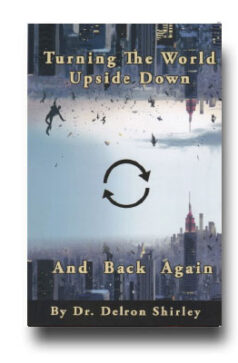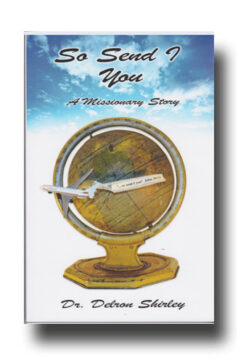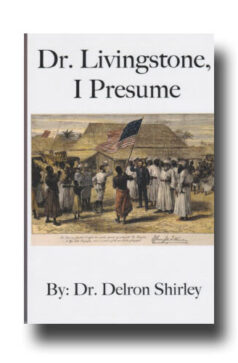After having travel from early morning on Saturday, I arrived in Monrovia late Sunday evening – only to find that my host was not at the airport to greet me. I had to fend off a barrage of “greeters” who wanted to offer me taxi rides, cell phone sim card, and advice about what to do since I had no one to receive me. Eventually, I was able to convince them that I wasn’t their typical “mark” and that I could take care of myself while waiting for my host. When James did eventually arrive, we headed into the one-hundred-thirty-acre ELWA (Eternal Love Winning Africa) campus located right on the Atlantic seaside. The compound houses a fifty-bed hospital, a four-hundred-student Christian elementary school, a youth camp, a Christian radio station, and housing for some of the staff. Because James’ wife is a doctor at the hospital, I was privileged to stay in the guesthouse that the ministry maintains for missionaries and visiting workers for their various ministries.
After having the delay of changing a tire due to a blow-out, it was pushing midnight by the time I was finally settled in for a very short night since we had to leave for the interior the following day. Fortunately, the Samaritan’s Purse Ministry had offered James and me seats on their eight-passenger single-engine prop plane that was headed to that area of the country that morning; unfortunately, we had to be at the airport by 7:30 AM – requiring that we leave the guesthouse by 6:30 AM to avoid the morning rush hour traffic. The airfield at our destination was a dirt strip in a clearing in the middle of a dense forest. From there, we were taken by Jeep to the village where the conference was to be held – about an hour’s drive away. As we bumped along on the dirt road, being subjected to a constant cloud of thick red dust, James mentioned to me that this is the main road through the region – leaving me to wonder what their secondary roads would be like.
James, who had been my student at Indiana Christian University, had won my respect by going back to Africa upon graduation – unlike the majority of our students who found jobs in America and forgot the need for the gospel back in their home countries. Even though he was requesting me to hold a pastors’ conference in this very remote area, I accepted the invitation, knowing that he had a real heart for the people there. He had scheduled the meeting in the village where he had grown up before it was razed during the civil war some quarter century ago. When peace was finally re-established, many of the residents had come back and resettled the village but had lacked the ability or resources to develop the proper infrastructure. James has taken the lead in organizing the citizenry to build a school so that the children don’t have to walk an hour each way for school every day – especially difficult in the rainy season when many of the children simply have to stay home. An additional impetus was the fact that one child had drown in the nearby river on the way to school the previous year. He has also spearheaded building a clinic so the villagers can receive immediate care in their own community without having to travel a long distance after an accident, when seriously ill, or when ready to give birth; a number of the local children have been born on the roadside before the mothers could make it to the clinic in the next town. The decision to hold the conference in Quessemba Town was one more step in his strategy of bringing significance to the village by letting all the pastors in the region – which includes not only the neighboring villages and towns in Liberia but also those across the river in Guinea – come there and see that something good can indeed come out of “Nazareth.”
When we arrived in the village, I was greeted by a flesh-and-blood demonstration of the African expression, “It takes a village.” Everybody in the village rushed out to greet us as our car drove into the town. They all began to sing and dance as we walked from the Jeep to the house where I was to spend the next several days. I soon learned that the whole structure had been built from the ground up in the past two weeks as everyone in the village had pitched in to do the carpentry, masonry work, plumbing, wiring, and painting. But let me define what I mean when I speak of plumbing and electrical work. There is no running water – just a toilet that has to be flushed by dumping in a bucket of water. The only other fixture is a sink that barely hangs on the wall because the person who delivered it stole the pedestal. I have no idea what he intends to do with a pedestal but no sink. The result is that there is no level surface in the bathroom to hold any toiletries – an issue that I made even worse the first time I bumped into basin. The thirteen-year-old plumber remedied my accident by cutting a tree branch and using it to prop up – but not level – the sink. In addition, there is no shower – just a bucket and a small pan for splashing oneself with water. Of course – as ill-fitted as this bathroom is – this new house is the only structure in the whole village with an indoor toilet. All the villagers use a common outhouse and an outdoor bathing area. None of the houses has any sort of indoor plumbing since they depend upon drawing water from the hand pump at the community well. The wiring is little more than a set of wires – leading to a couple light sockets and a couple outlets – attached to a generator that was rented for the week of the conference so that there could be a sound system for the meeting and a few lights around the village after sunset.
Shaving was a theological lesson. We all know that we are called to walk by faith and not by sight, and we have often heard the admonition that we cannot trust our feelings in matters of faith. Well, shaving without a mirror certainly eliminates the “sight” option but demands both the “faith” and the “feeling” options. I had to have faith that I could shave without butchering myself and then feel my face after each stroke of the razor to see if I had missed any areas.
Well, back to my arrival at Quessemba Town. After the long flights from the US and the short night in Monrovia, I asked if I could have a few hours to rest before starting any activities. I fell totally unconscious for a couple hours followed by another couple hours of semi-consciousness in which I was alert just enough to shoo away the flies that landed on every exposed area of my body not protected by the bedsheet – arms, neck, and face. Window screens are a luxury that couldn’t be afforded in this village. I did welcome the installation of a mosquito net later that afternoon. Even though it was not the season for mosquitos, it was apparently the peak of fly season. After I finally regained full cognizance, James gave me a tour of the town and explained the daily life of the villagers who are basically subsistence farmers raising palm oil and rice. One of the young men volunteered to demonstrate how he and his companions use harnesses to climb the palm trees and gather the fruit from which women extract the oil. The women showed me how they boil the fruit to obtain the first portion of the oil. Then I watched as the young girls broke open the seeds from inside the fruit to capture a second portion of the oil. Other women showed me the procedures that they go through to get the grains from their harvested rice followed by the winnowing process to separate the edible kernels from the husks and then the washing process to remove all the small stones and dirt that get mixed in with the rice in all these various steps.
One significant characteristic is that this village is fully into raising “free range” poultry in that chickens accompanied by their broods of baby chicks, ducks, and Guinea fowl are ubiquitous – scurrying about everywhere. That is except for one chicken that I found tied to a post outside my door. One of the ladies from the village, had brought it to me as a gift. After I graciously received it, a gentleman took it to the side of the house and cut its throat. The next thing I knew about my chicken was that it had turned into a stew the following day.
Speaking of free-range and ubiquitous – the other thing that is all pervasive about this village is cute little kids – all of whom except for the very small ones immediately became my friends. For some reason the really little ones are afraid of the “white man.” For all the rest, I became their favorite playmate as soon I began to poke and tickle them, give them “high fives,” and pick them up and turn them upside down. The only time they were not crowding around me, hugging me, touching my skin, and trying to pull my arms like a tug of war is when I was actually on the platform teaching or preaching. Even then, they pushed their way as close to the stage as the adults would allow.
In my walk around the village, I got to meet all the significant people of the community – the village chief, the chairwoman, the school teachers (who are only high school graduates but are considered qualified to run the school which goes through fourth grade), the nurse (a young man who will become head of the clinic when it is completed), and the town crier (yes, that’s what I said – a town crier who circulates through the village to announce when the people need to do certain tasks or gather for a public meeting). One special person that I got to see was a young lady that I had met when I was in Liberia six years before. At that time, she was severely tormented by demonic power from being involved in witchcraft. After prayer, she was dramatically set free. Today, she is back in her home village living a normal and productive life.
As we walked around the village, James pointed out a couple of things that I had a hard time believing. At the space where the conference was to be held, he showed me a building that was in the middle of the area were the people were to sit and commented that it would be gone by the following day. Then he pointed to the space where I would be standing to teach and said that there would be a cement platform there before the meetings started. When I asked how the meetings could possibly be held in the hot African sun, he responded that there would be a shelter over the whole area before the meetings would convene. The following day, I witnessed the power of “It takes a whole village” as the town crier announced that certain groups were to go to the nearby river to bring sand for the mixing concrete, that others were to go to the palm grove to bring sticks and palm branches, others were to collect firewood for the open-air fires where the food for the delegates would be cooked, and still others where to take on one task or another. Suddenly, everyone scattered; a short while later, they reappeared like lines of carpenter ants bearing their loads – children coming from the forest with bundles of firewood on their heads, women coming back from the riverbank with buckets of sand balanced on their heads, teenagers walking back from the marsh carrying mud bricks on their heads, and old men returning from the the palm groves with the palm fronds on their heads. Instantly, there was a beehive (pardon the mixed metaphor) of activity as the house miraculously disappeared, a brush arbor magically took from over the entire plaza that was dedicated for the conference, and a large concrete stage was surprisingly constructed even through the finishing touches had to be done by the light of flashlights after nightfall. To my amazement the concrete was actually set and ready for me to stand on it by the time the conference was to open the following morning.
But all was not just touring that day. One young man from a neighboring village who had come to volunteer with the work projects showed visible signs of some serious problems. When some of the young men of the village asked him what was wrong, he shared that something had happened that had left him speechless – but in this case, this was not an expression; it was an actual condition in which he could barely express himself. When they brought him to me, I began to question him about what had happened. At first, he could only say a word or two at a time – and they were very muffled. Eventually, I was able to understand that he had enlisted the aid of a witchdoctor to protect him from injury when he played soccer. As a result of the Juju incantation, he had become very withdrawn and unexpressive. As I led him in the sinner’s prayer, his speech became clear and strong, and after a deliverance prayer, he walked away as normal as all the rest of the young men on the volunteer team.
The whole village was abuzz with excitement as we awoke on the first morning of the conference. Some delegates had arrived the evening before, more were reaching the village in the early morning hours, and even more would trickle in throughout the day. Families welcomed guests into their huts, the two churches in the village make their sanctuaries available as dormitories, and the town hall was turned into a barracks – and every venue was quickly being filled. Caldrons were boiling on open campfires, readying the rice and chicken gravy for the meals. Benches from the church and chairs from every possible source were being set up under the brush arbor. The sound system was being positioned, and the generator was being cranked up. It was likely the biggest day in the history of this little village on the eastern border of Liberia. How fitting it was that all the excitement was because the Word of God was going to be proclaimed in their courtyard!
The conference sessions were translated into the two local tribal languages – Kissi and Banti – since not everyone could understand English. When the town chief introduced me to the first Banti delegate who arrived at the meeting, I thought he told me that the man was a bandit – prompting my curiosity as to whether the chief was warning me to watch out for him or if he was trying to tell me that the man had been a robber before his conversion. In the evening, we held an open revival session for the local villagers and the conference delegates who stayed in the village for the night. My message the first night led to a call for salvation with about a dozen responding to the invitation. When I asked later if all the people who got saved were from the village, I was surprised to hear that several were deletes at the conference. Of course, I followed up with the query as to how they could be considered church leaders if they weren’t even born again. It was then that I learned that one of the churches in the neighboring town never ministers on the salvation experience but simply tells the people to pay their tithes and do good works to earn their way to heaven. It’s my prayer that these individuals who responded to the altar call and found the true meaning of salvation will be able to go back and lead their entire congregation to the truth.
On the morning of the second day of the conference, I awoke to a chorus of ladies who had come to the guesthouse to serenade me with an early morning wake-up song. The conference continued with more lessons from my book Maximum Impact – but with a bit of a twist that I had never emphasized before. Since all these pastors were working in isolated and remote villages, I added a focus on the fact that we should not ignore, minimalize, or abandon ministry to seemingly insignificant individuals or people groups or non-strategic cities. I emphasized that Jesus came from the out-of-the-way village of Nazareth and that the little mill-hill town that I came from produced one young man who became the president of Lee University (one of the leading Christian colleges in America), the general overseer of the Church of God (a denomination with over seven million members in nearly forty thousand churches in one hundred eighty-five countries), and the president of the American Bible Society (a ministry that distributes millions Bibles to one hundred forty countries annually). I also told the story of how the deliverance of a prostitute in the Manila jail precipitated a revival that rocked the entire nation of the Philippines. That evening, I again spoke in the revival meeting and we saw more hands raised in response to the salvation call.
The final day of the pastors’ and leaders’ conference was one for the history books. Although our plans were to leave the village the following morning, James became concerned that we should try to leave that evening just in case there were complications or delays. He wanted a good buffer since I was scheduled to preach in two churches on Sunday and wanted to make sure that I got back to Monrovia in time to get a good rest and be refreshed and prepared for the services. It worked out conveniently that I did not have to stay for the revival meeting that evening since one of the churches had a guest evangelist who was to preach the following night and he could take the revival service that night; therefore, we compressed the sessions so as to finish with all our activities before lunch. I finalized the teaching in the first two sessions and opened the third session with a period of questions and answers. When I was presented with the first question about whether women should be allowed to minister, I quotes Isaiah 55:12 about the mountains and hills breaking forth in joy and the trees clapping their hands, I Chronicles 16:32 about the sea roaring and the fields rejoicing, and Luke 19:40 about the stones crying out; then I asked why God would command all of nature to preach for Him and insist that women be quiet. When the next question about allowing illiterate individuals to minister was presented, one of the delegates grabbed the microphone and gave his own answer before I was able to respond. I wanted to counter his point by telling the audience about the orality movement that trains illiterate people around the world to become Christian leaders but decided rather to share the story of Tommy Hicks – an illiterate bicycle repairman and alcoholic who was miraculously saved and given the ability to read the Bible even though he couldn’t read any other book – who became a Bible teacher that attracted audiences filled with very successful businessmen, doctors, lawyers, and university professors. Since the village eldership had asked that I would pray for the children of the village and since many of the delegates had asked for personal prayer, I followed the Q&A session with a general prayer for the children and a special prayer for the conference delegates and then asked everybody to line up so I could quickly lay hands on each one. Before I released them to come forward, I related the story of an incident that had occurred just a month earlier in Tanzania when a pastor poured anointing oil in the doorway of his church and told the congregation that everyone who stepped on the oil would be blessed. The pandemonium as everyone rushed to step on the oil resulted in a stampede in which twenty people were trampled to death. I insisted that they be polite and not push or shove. Everything when fairly smoothly at that point; however, the next item on the agenda made me think that we were going to see a replay of the Tanzania tragedy. I had two hundred copies of the textbook to give away. Since many of the delegates spoke only their tribal languages, some of the Guinea delegates spoke French, and many – especially the women – were illiterate, I asked for only those who could read English to please come up to receive a book. Unfortunately, everyone rushed forward so that many of the ones who grabbed the books will never be able to read them and many who would have benefited from having books left without copies.
After our lunch and the usual African last-minute delays, we got on the road about three o’clock for what turned out to be a real adventure. Since we had flown to the nearby airfield on the way in, I knew that I was facing a rough dusty ride for the first hour of the journey but assumed that there would be a paved road from there to the capital. Boy, did I have an awakening in store! We went back to the town where the airfield is located in the same car that picked us up earlier in the week. While in town, James needed some extra cash for the drive back to the city; so, he had his wife transfer money through his cell phone which he was able to pick up at a location in town – an arrangement that totally amazed me since we were in a desolate place almost two hundred miles from a paved road, much less a major city or business center. After finding a “commercial vehicle” to hire to drive us to our destination in Monrovia, our little team comfortably took our places with me in the front passenger’s seat and James, Joshua (one of the young men James is disciplining), and a lady from the village who was bringing her newborn baby to show her off to relatives in the city in the backseat. One of the first things we that noticed about our ride was that there were no seatbelts. It was explained that they had all been cut out to make a tow rope to pull the car out of a mud hole during a previous rainy season. We had driven less than a mile when one of the tires blew out. Once the driver changed the tire, he was ready to head out on our journey; however, we insisted that he go back into town and buy a spare. After all, this was the second blow-out I had experienced on this trip – and I had only ridden in three cars! When the driver came back with the spare, he also had two more passengers whom he accommodated by putting the lady in the back seat with James, Joshua, and the woman with the baby and the man in the luggage compartment which had been cleared out by piling the bags on the roof. Once we were all snuggly in position, the newly added lady passenger offered a prayer for our safely, specifically mentioning that Jesus was in control of our journey. Finally, we were off – but not on a paved road as I had anticipated. The driver cruised along like a bat out of a hot place, as I muttered a prayer that Jesus really was in control of our journey and that He would help the driver see all the gullies and wash-outs in time to slow down enough to avoid crashing the vehicle when we hit them. About an hour into our trip, the driver pulled to the side of the road because the radiator was overheating. When he opened the hood, I could see him stripping wires with his teeth and twisting them back together using plastic bags as insulation around his new splices. He explained that the problem was that fan was not working well. By the time that the engine had cooled enough for water to be added and he felt that the fan was working well enough for us to proceed, a new issue arose. A gentleman from the village where he had stopped accosted him. Apparently, the driver had borrowed a five-gallon container of gasoline from him a few days before and had not returned it. Since there are no gas stations on this road for at least the next fifty miles, this was a serious issue. The driver tried to lie his way out of the accusation but was caught “red-handed” when the gentleman spotted the container – with his name and cell number cleared marked on it – on the luggage rack of the car. Of course, there was no gas in it to return to the man who needed it for his chainsaw business. After a lot of yelling and name calling, we were finally on our way again – at least for a few minutes. In less than half an hour, we were on the side of the road again with the over-heated radiation. This time, there was no steam – just an empty radiator. I suggested that there must be a leak in one of the radiator hoses or the radiator itself, but the driver was insistent that the problem was the fan. So, after, more water was added, we were off again. This time, it took only fifteen minutes before we were on the roadside yet again. The following time, it took us only ten minutes before we had to pullover. By this time, the driver had been through three five-gallon containers of water and finally decided that it would be wise to check the hoses. Perhaps I was the only one who was not amazed when he discovered that one hose was almost totally severed in two. Fortunately, he had a spare and was able to make a quick repair. Our next adventure came when we had to stop for an inspection at the forest service checkpoint where the rangers search the vehicles for bush meat – illegally poached animals that are sold as delicacies in the city. When the rangers looked in the back of the car where our recent add-on passenger was sitting, he discovered a live endangered-species turtle. I had actually been wondering if we might see some wildlife on the drive through the forest – never suspecting that we were actually carrying something in our own vehicle – so, I thought that this would make a great photo. Little did I know that my camera would become a major object of controversy. The photo became evidence that would eliminate the option of an under-the-table bribe so that the poacher could take the turtle and have it for stew the next night. Now, the rangers were cornered into enforcing the law. In the process, I somehow became a culprit and was confined to the car while everyone else was free to walk about and enjoy the “circus.” The rangers threatened the man with being detained until the morning to appear in court where he would certainly receive a fine equivalent to about two weeks’ salary in the Liberian economy. After at least an hour of commotion and yelling – and possibly an exchange of money beyond my range of view – the rangers took the turtle and released the man. By this time, our driver had disappeared. It seems that he had taken the stop as an opportunity to re-examine the radiator fan and – after deciding that the fan was not working – had walked back into town and found a replacement part. Now, after more wire-stripping between his teeth, both the fan and the hose were in good enough shape for us to continue. Unfortunately, there are more parts to a car than tires, hoses, and fan; there are also headlights – which decided to go out at 1:30 AM in the middle of nowhere, giving rise to more dental dexterity under the hood. Once the last bit of plastic bag was applied as insulation, we were safely on the road – and this time it was a real road. By 2 AM, we finally reached the paved road which was actually in better condition than many of the roads back home. I was amazed that there were absolutely no potholes for the remainder of our journey! On top of that, our two guests – the woman who had prayed over our journey and given it totally to Jesus and the turtle poacher – got out at a stop as soon as we reached the paved road. Now that we were in for a smooth ride and had more elbow room, we knew that we could get some sleep. But there was one new development – the driver decided to play the radio; I assume he needed the stimulation to help keep him awake. Suddenly the car was filled with blaring noise that some people might think to be music accompanied with lewd – actually, vulgar – lyrics. Fortunately, around 3:30 AM, he felt that he needed a little shut-eye; so, he pulled over until five o’clock before starting off on the final two-hour leg of our journey to Monrovia – thankfully, much of it without the “musical” accompaniment. When we finally arrived after the all-night ordeal on the dirt road, we were no longer black or white – we were all red!
Back in Monrovia, I returned to the LEWA guesthouse. After the week in the village, an air conditioned room with a hot shower, a flush toilet, and internet connection was a real treat – and the view of the ocean was an added bonus and blessing. Yes, He is the God who supplies more than we could think or ask! After a day to catch up on my journaling for the trip and go through all the emails that had piled up during the week that I was out of internet range, I was ready for my next ministry assignments. I woke up early Sunday morning to take an early-morning hike along the beach before the heat of the sun became intense. About a mile up the beach, I discovered a little fishing village where many of the boats were named – in typical African fashion – with spiritual slogans such as “More Blessed,” “God is Able,” and “Anointed.” I hurried back to enjoy the hot shower and get dressed to be picked up for the church services. I had been told that I would need to conclude by noon at the first church so that we could be at the second church by half past twelve. I carefully timed my preaching and prayer so that we walked out of the building exactly on schedule; however, thirty minutes, later we were just leaving the outskirts of Monrovia and hadn’t even entered the highway leading to the next town. By a quarter past one, we finally reached the city were the next church was located. But this didn’t mean that we were at the church; it is a mission church on a rubber plantation, and we needed to drive through the estate to get to it. By a quarter to two, we had traversed dirt road through the massive planation – fording mud puddles and braving gullies that nearly ripped the muffler off the car. At the end of the road, we had to get out and hike another fifteen minutes, crossing three footbridges comprised of the trunks of felled rubber trees. When we finally arrived, we found the entire congregation eagerly awaiting us even though we were an hour and a half late. The best explanation I could get as to why we allotted only thirty minutes for a two-hour trip is that it is only a half-hour drive between the city limits of the two cities. Why bother to count the time it would take to get from the first church to the city limit of the first city and from the city limit of the second city to the second church?
“In Jesus’ name” is a catch phrase among Liberian Christians. Every testimony, song, offering, and sermon begins with the phrase to get the congregation’s attention. If the response is not emphatic enough, the exhortation is repeated again with an exclamation point. If the response to that is still insufficient, a second exclamation point is added — and so on until crescendo reaches a level that pleases the individual with the mic. Therefore, I chose to minister in both the churches on the meaning and power of the name of Jesus — a message that seemed to genuinely impact the people. After preaching and praying for the people and having a little lunch with the pastor at the rubber plantation church, we hiked back to the car and headed off on our return trek. Within minutes of reaching the paved road, a drenching rain suddenly began to pour down upon us. Had our journey been delayed just a few more minutes or had the cloudburst come a few minutes earlier, we would have certainly been stuck in the mud in one of the gullies on the estate. Of course, the silver lining to that would have been that James’ car still had all its seatbelts that we could have cut out and used as tow ropes!
Travel in Liberia consist of stopping at checkpoints every few miles. The all-night journey from the village included at least eight such stops, but the trip home from the rubber plantation involved only one. When the officer questioned James about his foreign passenger, he explained that I am a missionary. The next thing we knew, the officer had stuck her hand into the car and reached toward me – then, she asked for prayer!
My final day in Liberia began by speaking at the chapel service for the staff at the hospital where James’ wife works; I encouraged them that – since they are laborers together with God (I Corinthians 3:9) and that God is working with them (Mark 16:20) – they should be ever aware that everything they do each day will in one way or another be the hand of God touching the patients that they serve. After the chapel service, James and I stopped by to visit a pastor who works with Christian Aid Ministry. He had actually driven all the way to the conference in the village for just one meeting because he wanted to deliver some humanitarian aid supplies to the people, and we wanted to stop by his home to thank him for the special effort he had made. We caught him just as he was leaving his house and spent a few minutes sharing with him before he hurried on his way to work. A little later, he phoned to say that his boss had asked why he was late to work – the first time he had been tardy in the twenty-one years he had served in his position. When the pastor explained about our visit, his boss said that he would like to meet the missionary whom his employee respected highly enough to tarnish his perfect attendance record. So after stopping by a roadside mechanic shop to get the muffler welded back to the exhaust system, we headed to the Christian Aid compound for a visit and a tour. After one more quick stop at a furniture-manufacturing shop that James manages as a way to help young men learn skills so they can support themselves, I returned to the guesthouse for a short rest before leaving on my long trip back to the States. I took the time on the plane to read Before We Kill and Eat You, the story of Henry and Ruth Garlock who were pioneer missionaries to Liberia exactly one hundred years ago. As I read the accounts of how they survived deadly tropical diseases like malaria and jungle fever and how they were miraculously preserved through attacks of hostile tribes of cannibals, I praised God that even though the roads were still dirt, the villages were still without water and electricity, and the cars were falling apart that at least I didn’t have to hack my way throught he jungle with a machete while fighting off deadly diseases and naked warriors with an appetite for human flesh!










